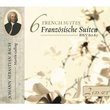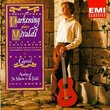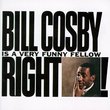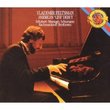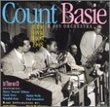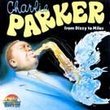| All Artists: Philip Glass; Bruckner Orchester Linz Title: Philip Glass : Symphony No. 8 Members Wishing: 2 Total Copies: 0 Label: Orange Mountain Music Original Release Date: 3/15/2006 Release Date: 3/15/2006 Album Type: Import Genres: Pop, Classical Styles: Easy Listening, Historical Periods, Modern, 20th, & 21st Century, Symphonies Number of Discs: 1 SwapaCD Credits: 1 UPC: 801837002829 |
Search - Philip Glass; Bruckner Orchester Linz :: Philip Glass : Symphony No. 8
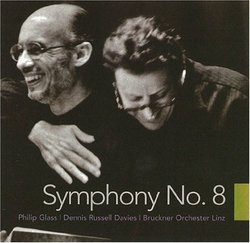 | Philip Glass; Bruckner Orchester Linz Philip Glass : Symphony No. 8 Genres: Pop, Classical
|
Larger Image |
CD DetailsSimilar CDsSimilarly Requested CDs
|
CD ReviewsA New Symphony R. Guerin | Brooklyn, NY | 04/06/2006 (5 out of 5 stars) "There's been lots of discussion about Philip Glass's Symphonies. Two have been based on the music of Brian Eno and David Bowie, the second of which also double as ballet music. Symphony No.3 is scored for small string orchestra of strings only. Symphony 5,6 & 7 are set to text in the traditions of Mahler (8) and Beethoven (9). This new Symphony no.8 stands almost alone in Glass's Symphonic output as unique in symphonic content. Arguably the 2nd Symphony could be considered as well because of its proportions and its content-however the Second's preoccupation with 'an exercize of polytonality' and its slender musical material WHEN juxtaposed to that of the 8th, make it clear that Glass had more involved concepts of the traditions of symphonic music when conceiving and writing this piece. The first movement, at almost 19 minutes, contains multiple sections which state a theme then have its components morph into something else entirely-each time with innovation and beauty. All of these sections are glued together by "stretto" passages (not altogether dissimilar in concept from the five climaxes in the first movement of Mahler 9) which steadily accelerate into cacophonous climaxes. Very exciting stuff. The second and third movements are lyrically beautiful. The second is based on a harmonic base of a passacaglia which stretches the composer's sense of tonality as far as it has ever gone. And the third movement is comprised of lovely elongated lines which bring the symphony to a close in a somber and beautiful manner. All in all, this symphony offers mature stylistic and clarified ideas from the composer, as well as an open sense of seriousness and a desire to touch its audience. Lots of innovations; musical material in abundance...incredibly interesting and fascinating. Stylistically not unlike other pieces he has composed, but as strong a piece that has ever come from this unique voice." ... Symphony No. 8 is a Charm for Philip Glass Ricardo Francis | 09/28/2006 (3 out of 5 stars) "Philip Glass' Symphony #8 is arguably the best symphony he has written to date and one of the most spirited instrumental works he has created in years. Under the always faithful baton of Dennis Russel Davies with the Bruckner Orchestra Linz performing. Glass' most recent symphony proves that this mostly film and opera composer can create something in the world of (in his own words) abstract concert music worth listening to. Ever since Glass' premiere of the Low Symphony in the early 90's (based on themes from Brian Eno and David Bowie's collaborative album of the late seventies entitled Low). The composer who at that time created a prolific body of work in the genres of film, opera, dance, theater, chamber music, and at times a mixture of all of the above seemed to step in an exciting new direction that at that time was quite unexpectant for both ardent fans of the composer and even Philip Glass himself. After the Low Symphony all of the other symphonies (mostly commisioned by longtime confidante Russel Davies) came as fast and furious as a car on the assembly line at the Ford Motor Company. Some were good, most were bad, and all unfortunately were as foursquare and predictable as the next. Worse than that every new symphonic work that came after the other would all very much sound identical to each other in some way. After about a decade of symphonies from Philip Glass one might have thought that it seemed to be just another paycheck for a composer who has carved his career from at times repeating what he does all to well in the first place. Luckily here Glass comes full circle with Symphony No. 8 and goes "for the juggular" right from the very start in the first movement. The opening moment is loud, galiant, and expressively triumphant. Then with unexpected surprise, Glass adds and or subtracts several rythmic elements in the structure of the movement. His use of the orchestra is profoundly rich and flourishes with a vigor that is undoubtedly enthusiastic. Add of course his use of inventive polytonality via: hyperkenetic arching lines, harmonic sliding, counterpoint, and intriguing sudden changes in musical themes and motifs, altogether this brilliant mix of density and complexity keeps one on the edge of his or her seat for about 20 minutes. And in some ways the excitement stops there (or does it?). The second movement could be called a "grand stately march" tinged in melancholy. It gives the impression of trying to drive during a foggy day. Themes here are mixed slowly against each other, structurally the second movement takes a cue from the first one yet its slower and is in essence a passacaglia. There is some genuine lyrical music here throughout the movement and for just a few bars the flute and harp share a beautiful dialogue with each other in the middle of this section. The third movement is the most unlikely third movement probably in the history of symphonic composition. And although it is astoundingly beautiful and elegant, it is also even slower than the preceeding movement and sounds more like the ending of a movie soundtrack. Over all this movement fails to connect to what was happening before it and although it is 6 minutes of beautiful music it seems more like an afterthought than anything else. As symphonies goes for Philip Glass. Symphony # 8 is quite simply the best of Glass' output in this genre yet. I do await the next few at this point to see what he does." Great music, but 39 minutes? Jackson P. Mangus | Ocala, FL United States | 04/23/2006 (3 out of 5 stars) "As a Philip Glass fan of the first order I'm pleased to hear him return, as he says in the liner notes, "to orchestral music where the subject of the work is the language of music itself, as in the tradition of the 18th and 19th century symphonies." Based on the music alone, I would give this CD 5 stars, but seeing as how it offers less than 40 minutes of music, I can't give it more than 3. Come on, Orange Mountain Music, you claim you have a wealth of unreleased Philip Glass material that has been recorded over the past 30 years. Why didn't you put at least 30 minutes of it on this CD?"
|

 Track Listings (3) - Disc #1
Track Listings (3) - Disc #1